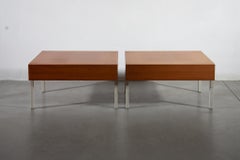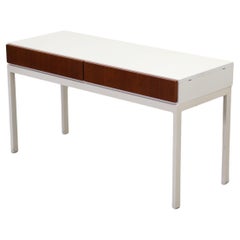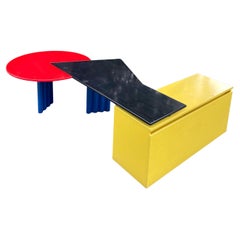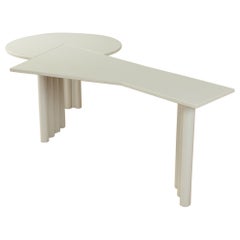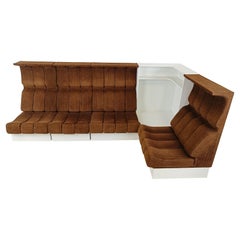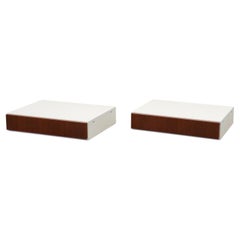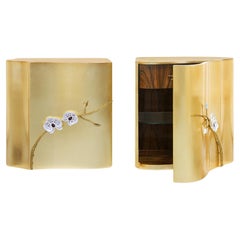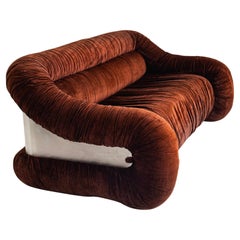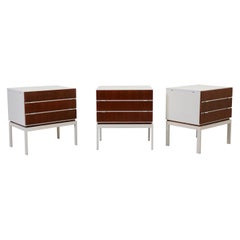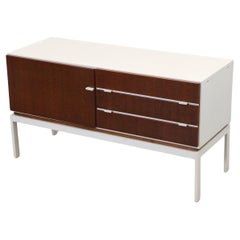Interlübke Furniture
During the 1930s, a company called Interlübke was established by brothers Leo and Hans Lübke to produce affordable bedroom furniture such as dressers, beds and other items for homeowners in the founders' native Germany. While the brand has changed and expanded its offerings over the years, it is still committed to producing well-made handcrafted furnishings for the home.
Cor is Latin for heart, and COR furniture exemplifies the qualities at the heart of exceptional design: practicality, comfort and style. The company's sofas, lounge chairs and coffee tables capture the essence of the best of mid-century modernism. Simple silhouettes, quality materials and function-first designs ensure that vintage COR furniture is still in high demand with collectors all over the world.
COR was founded in Rheda-Wiedenbrück, Germany, in 1954 by Leo Lübke — in the name of his son, Helmut — and the Prince of Bentheim-Tecklenburg, a northern German county. Nearly a couple of decades prior, in 1937, a manufacturer of bedroom furniture called Interlübke was established by Leo and his brother Hans. The latter’s son Horst, who was managing partner from 1972, retired during the 1990s and his son Helmut Lübke joined Interlübke and shifted the brand’s focus toward modular furniture systems. During the 1980s, the Prince of Bentheim-Tecklenburg left COR and the Lübke family became its sole owner. In 2006, COR-Interlübke retail locations opened their doors.
COR, which was primarily focused on upholstered furniture from its earliest days, made its mark in 1959 with a sleek modular seating system consisting of five parts called Quinta, which was created by designer Michael Bayer (the first creative director at Interlübke). The upholstered line boasted clean, angular contours and appealed to the day's ever-broadening flexible interior design sensibilities. The same thinking is applied at Interlübke, where designers busied themselves during the 1960s with developing storage furniture that could be endlessly expanded upon. At COR, the Quinta remained in production until 1978. The success of the Quinta was followed by the 1964 Conseta system, which featured a sofa and other pieces of seating designed by Friedrich Wilhelm Möller.
The following decades saw more successful collaborations at the Lübke family-run brands with designers like Peter Maly — who designed Memphis-style cabinets for Interlübke and postmodern seating in Pop art colors for COR — and Luigi Colani. The latter, a German industrial designer born Lutz Colani, created a range of gorgeous organically shaped Space Age seating for BASF and Fritz Hansen, serveware for Rosenthal and worked on automobile designs for Fiat. Colani designed the popular Orbis line for COR during the 1970s.
In 2000, the Arthe sofa by Wulf Schneider was awarded the prestigious Red Dot Award from the North Rhine-Westphalia Design Centre.
COR is still owned and operated by the Lübke family’s parent company Gebrüder Lübke GmbH & Co. KG and continues to produce furniture at the Rheda-Wiedenbrück factory, sourcing leather from southern Germany and upholstery from Italy. COR partnered with Jehs+Laub, a renowned Stuttgart-based studio, in 2010. In 2022, Interlübke was sold to Domovari, a manufacturer of bathroom accessories and interiors.
Find a collection of Interlübke furniture on 1stDibs.
1970s German Mid-Century Modern Vintage Interlübke Furniture
Chrome
Mid-20th Century German Mid-Century Modern Interlübke Furniture
Metal
1980s German Post-Modern Vintage Interlübke Furniture
Metal
1980s German Post-Modern Vintage Interlübke Furniture
Steel
1970s German Space Age Vintage Interlübke Furniture
Fabric
Mid-20th Century German Mid-Century Modern Interlübke Furniture
Wood
1980s German Post-Modern Vintage Interlübke Furniture
Wood
1970s German Mid-Century Modern Vintage Interlübke Furniture
Marble
1970s German Mid-Century Modern Vintage Interlübke Furniture
Wood
1980s German Post-Modern Vintage Interlübke Furniture
Aluminum
1970s German Mid-Century Modern Vintage Interlübke Furniture
Chrome
Late 20th Century German Minimalist Interlübke Furniture
Aluminum
1980s German Mid-Century Modern Vintage Interlübke Furniture
Plastic, Wood
1970s German Mid-Century Modern Vintage Interlübke Furniture
Stainless Steel
1980s German Mid-Century Modern Vintage Interlübke Furniture
Steel
1970s German Space Age Vintage Interlübke Furniture
Fabric
2010s Portuguese Post-Modern Interlübke Furniture
Crystal, Gold Leaf
Mid-20th Century Italian Space Age Interlübke Furniture
Stainless Steel
1950s Czech Mid-Century Modern Vintage Interlübke Furniture
Opaline Glass, Oak
1950s Dutch Mid-Century Modern Vintage Interlübke Furniture
Oak
19th Century Japanese Antique Interlübke Furniture
Wood
1970s Slovenian Mid-Century Modern Vintage Interlübke Furniture
Hardwood, Plywood
1970s Italian Mid-Century Modern Vintage Interlübke Furniture
Metal
1960s French Mid-Century Modern Vintage Interlübke Furniture
Teak
1980s Italian Vintage Interlübke Furniture
Bamboo
1960s French Mid-Century Modern Vintage Interlübke Furniture
Teak
1970s Czech Mid-Century Modern Vintage Interlübke Furniture
Ash, Mahogany
Mid-20th Century British Mid-Century Modern Interlübke Furniture
Birch, Maple
Mid-20th Century German Mid-Century Modern Interlübke Furniture
Wood, Laminate
Mid-20th Century German Mid-Century Modern Interlübke Furniture
Metal
1980s German Mid-Century Modern Vintage Interlübke Furniture
Plastic, Wood
1970s German Mid-Century Modern Vintage Interlübke Furniture
Wood
1960s German Mid-Century Modern Vintage Interlübke Furniture
Mohair, Rosewood
1970s German Mid-Century Modern Vintage Interlübke Furniture
Plastic, Wood
Late 20th Century German Post-Modern Interlübke Furniture
Wood
1980s German Vintage Interlübke Furniture
Wood
1970s German Bauhaus Vintage Interlübke Furniture
Stainless Steel
1970s German Mid-Century Modern Vintage Interlübke Furniture
Aluminum
1980s German Post-Modern Vintage Interlübke Furniture
Wood
1980s German Vintage Interlübke Furniture
Brass
